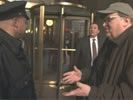Eye For Film >> Movies >> Capitalism: A Love Story (2009) Film Review
A bank robbery during the opening credits, a massive scale citizen’s arrest at the end. In between Michael Moore examines an American love affair gone wrong, in a film which in sheer entertainment terms is his best yet.
After Fahrenheit 9/11, Moore turned his attention back to corporate America. Then came the financial crisis of 2008, followed by the Wall St bailout, which prompted him to reshape his film.

Moore is an expert at softening up his audience before delivering the killer punch. Here he uses all his old tricks, but wisely includes fewer episodes than usual of the guy in the baseball cap with the megaphone or the guy in the baseball cap being cut off on the phone.
Clips from an old film about the Roman empire with sonorous voiceover are intercut with scenes of present day Washington. But will this be remembered as a glorious age? Around America, ordinary workers are losing their jobs and being evicted from their homes. Then companies such as the aptly named Condo Vultures are buying and selling the homes after foreclosure. How did it come to this?
First there were the good times, when the nation fell in love. In the 1950s (cue more hilarious old film clips), capitalism meant getting more and more of everything you always wanted, at least if you were white, able bodied and in the right place. How could it be otherwise when the war had knocked out all the competition? For some Americans life just got better and better, and through Hollywood films the rest of us could press our noses to the window and dream.
Then other nations, such as Germany and Japan, began to catch up in terms of production, and there was a bit of a wobble when President Carter warned Americans against worshipping consumption. What a relief then for corporate America when Reagan came along and Wall St was firmly back in control. Productivity went up and the top income rate was cut, while unions were destroyed, debt rose and Moore made Roger And Me.
The love affair turns sour. Private companies take over government enterprises, like the Pennsylvania child detention centre where the judiciary allegedly work with the owners to lock children away for profit. Companies like Walmart secretly take out life insurance policies on their workers, known as Dead Peasant insurance. With weakened unions, airline pilots are underpaid and dangerously overworked.
How does the Christian church respond to this? Moore interviews priests and a bishop who say that capitalism is immoral. Perhaps they haven’t been saying it loud enough. “Jesus was hijacked,” they say.
Moore leads us on through the election of Obama (Oh no, a socialist!) to the banking crisis and the bailout achieved, we are told, by the packing of the Treasury with ex-Goldman Sachs employees. It is a journey enlivened by snazzy editing, dubbing, animation and an excellent match of music from Louie, Louie to the Internationale via a great spoof commercial for Cleveland - “At least we’re not Detroit”.
But some of Moore’s tricks don’t quite come off, like his practice of highlighting bits of text, for instance in a document from Citibank about plutocracy. This has become a staple of political documentaries. Hang on a minute. What about the bits you didn’t show us? I dare say it’s possible to highlight bits of the Declaration of Independence and make it look like a fascist tract. As for George Bush, he’s a fish in a barrel.
The most intriguing part of this film, in my opinion, is where Moore delves a little further back in American history, to the time of President F D Roosevelt, with his support for workers’ rights and his plans for a Second Bill of Rights. Unfortunately he died before he could put more of his socialist ideals into practice. Moore has found footage of his funeral, lost for 65 years and apparently never shown in theatres at the time. The expressions on the faces of the mourners, black and white, are very moving. America could have been a very different place.
This film was shown at Sheffield’s Doc/fest and goes on general UK release in February. It was very well received by the festival audience, though preaching to the converted. It was followed by a Q and A session with Michael Moore on Skype, apparently the first he has ever done. He filled us in on some of the background to making the film and the change of focus brought about by the bank bailout. He expanded a little on some of his suggestions made in the film for a way forward, companies being run as co-operatives etc. When asked whether he ran into difficulties with his final scene, where he attempts to surround Wall St with yellow crime scene tape, he told us the police, who have had their budget severely cut, said: “Just go ahead, Michael.”
Reviewed on: 08 Nov 2009


















